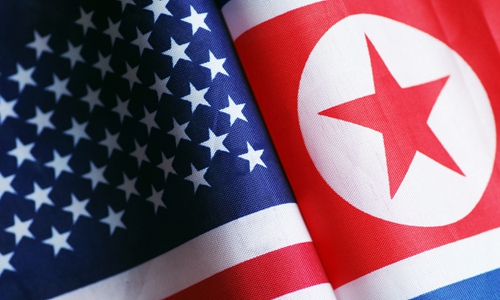HOME >> OPINION
Compromises by stakeholders necessary for resolving Korean Peninsula crisis
By Wang Sheng Source:Global Times Published: 2019/11/21 19:53:41

Photo: IC
US Defense Secretary Mark Esper said on Sunday that the US and South Korea have indefinitely postponed a joint military exercise in an "act of goodwill" toward North Korea, according to media reports. Yet if Washington wants Pyongyang to return to the negotiating table, it needs to take further pragmatic steps.
In an April speech, North Korean leader Kim Jong-un said he would "wait with patience until the end of the year for the US to come up with a courageous decision." As the deadline approaches, if the US does not suspend its military drills with South Korea, or take cordial measures in other domains, the situation on the Korean Peninsula could worsen again. In that case, countries in the region may doubt US sincerity to resolve the Korean Peninsula nuclear issue, lose faith in Washington and tend to explore a new path to deal with the crisis in this regard.
China proposed "double suspension" to help the US and North Korea break out of the security dilemma and return to the negotiating table. "Double suspension" refers to cessation in North Korean nuclear and missile activity in exchange for suspension of large-scale US-South Korea war games. Pyongyang regards the military exercises Washington and Seoul conducted jointly as hostile. Esper's decision can thus be seen as a response to North Korea's concern.
For South Korea, launching military drills is expensive. The US is seeking up to $5 billion annually from South Korea as defense expenditure, "more than five times the 1.04 trillion won ($890.54 million) South Korea agreed to pay this year," said Reuters. It also reported that South Korean progressive groups protested on Monday against "highway robbery" by "greedy" Americans. Esper's decision may help calm the protesters.
Kim Kye-gwan, advisor to the foreign ministry of North Korea, said on Monday that North Korea is not interested in "talks that have no benefit for us" and giving US President Donald Trump anything to brag about as Pyongyang has received nothing in return, in a statement carried by the official Korean Central News Agency.
Kim sounds reasonable in making this statement. In spite of interactions with the US at Singapore and Hanoi summits, and at Panmunjom, Pyongyang's distrust for Washington has not abated. North Korea believes that with one year left for the 2020 US presidential election, Washington is just paying lip service to Pyongyang to stop the latter from engaging in nuclear and missiles activities, so that Trump has another achievement to showcase in front of the US voters. But Washington fails to realize that Pyongyang sees no practical meaning in any such talk.
North Korea has appealed to ensure the security of its political system and abolition of hostile US policies. In terms of guaranteeing its system security, it hopes Washington will suspend the massive military exercises with Seoul, formally turn the Korean Armistice Agreement into a peace treaty. Moreover, North Korea wants to establish normal diplomatic relations with the US.
China believes that the UN Security Council needs to consider invoking, in due course, reversible provisions to encourage North Korea and other relevant parties to make bigger strides toward denuclearization.
Over the past two years, North Korea has not conducted massive nuclear or missile tests. The country also dismantled its Yongbyon nuclear facility. Therefore, North Korea hopes the US and UN could discuss about reversible provisions of their sanctions and lift some of them.
If these appeals cannot be accepted, the prospects of future Washington-Pyongyang talks are bleak. If the US wants to bring North Korea back to the negotiating table, lip service is meaningless. More concrete steps are needed. Otherwise, North Korea will regard any US move as perfunctory. Pyongyang may have hoped to send messages to Washington by recent super-large multiple rocket launcher tests: If the US returns to the "strategic patience" policy of former US president Barack Obama on North Korea, Pyongyang will not rule out the possibility of carrying out more missile and nuclear tests. North Korea intends to pressure Washington so as to jointly solve the Korean Peninsula nuclear issue.
Without properly resolving the nuclear issue, it will be difficult for North Korea to achieve progress in other realms, including economic development.
The US has not yet dropped its hostile policies because of its distrust for North Korea. Washington thinks Pyongyang's denuclearization is "reversible." Therefore, the US is reluctant to lift sanctions.
That being said, to tackle the Korean Peninsula nuclear issue, both sides have to make more compromises to achieve mutual trust.
The author is a professor of Department of International Politics of School of Public Administration at Jilin University, and an expert on the Korean Peninsula issue. opinion@globaltimes.com.cn
RELATED ARTICLES:
Posted in: VIEWPOINT,ASIAN REVIEW